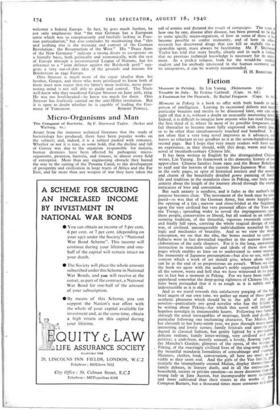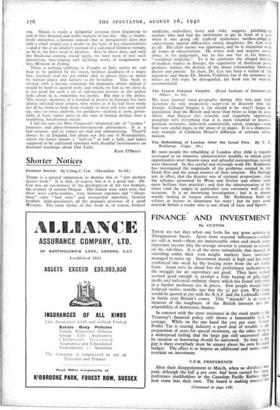Fiction
A Footman for the Peacock. By Rachel Ferguson. (Cape. 85. 6d Moment in Peking is a book to offer with both hands to an person of intelligence. Leaving its occasional defects and man particular beauties and merits to be discussed later, one can so right off that it is, without a doubt an unusually interesting novel Indeed, it is difficult to imagine how anyone who has read throw the first third of it, where lie most of its possible lcmgueurs, c fail thereafter to become more fully engrossed with every page or to be other than simultaneously touched and benefited. It I not often that a very long novel improves as it advances, an leaves us reluctant to say goodbye to it at the seven-hundred-and second page. But I hope that very many readers will have sue an experience, as they should, with this deep, warm and nag novel of twentieth-century Chinese life.
It has been written in English by the distinguished Chine writer, Lin Yutang. Its framework is the domestic history of to upper-class Chinese families from 190o and the Boxer Rebellio to 1938 and the horrors of the current Sino-Japanese War. in the early pages, in spite of historical interest and the nove and charm of the beautifully detailed genre painting of faint life and tradition in the mandarin class in Peking, one feels sem anxiety about the length of the journey ahead through the etern intricacies of love and convention.
But such anxiety is needless, and it fades as the author's purpose becomes clear. The movement of the book may be corn pared—as was that of the German Army, but more happily--t the opening of a fan ; narrow and close-folded at the beginnin upon the very civilised but very personal affairs of the Yaos the Tsengs ; spreading wider to reveal the impingements u these people, conservative or liberal, but all soaked in an infinite seeming tradition, of the thrustful, vigorous twentieth century and finally full open, carrying the whole tragical design of to war, of civilised. unconquerable individualism assaulted by th logic and mechanics of brutality. And as we view the whol conception, we see that the ribs, the bones needed to carry fullness were in fact dovetailed together in the narrow domesn elaborations of the early chapters. For it is the long, unwavenn instruction in mandarin culture and ideals of these slow earl pages which enables us later on to understand in some Incas the immensity of Japanese presumption—but also to see, with tb content which a work of art should give, where alone victo can lie at the end of so preposterous an assault. When we do the book we agree with the author's nobly supported faith th all the sorrow, waste and hell that we have witnessed in its pig are in fact but a moment in Peking. For we have been made t apprehend somewhat the deep-going rightness of Chinese life, an have been persuaded that it is as tough as it is subtle and indestructible as it is old.
And as we travel towards this satisfactory purging of the ha brief angers of our own time. we gather up many of those pun. aesthetic pleasures which should be in the gift of the g novelist—particularly any good novelist who has the felicity be writing about Peking—for which this novel will inflame hopeless nostalgia in innumerable hearts. Following two fanull through the usual inescapables of marriage, birth and death ; particular following one enchanting character, Yao Mulan, f her eleventh to her forty-ninth year, we pass through many none interesting and lovely scenes; family festivals and quarrels CO,, ducted in classical fashion, but gently lighted by a parucula delicate realism; family letter-writing, very civilised and petitive; a crab-feast, merrily sensual; a lovely, flowing Partv. - the Manchu's Garden; glimpses of the opera, of the movies
• Peking, of the exactingly civilised lives of the sing-song girls
the beautiful mandarin formalities of concubinage and m Manners, clothes, food, conversation, all here are made. as viable as they seem real. And the girls of the Yao ticularly the triumphantly created Mulan, display thernsetv family debates, in literary duels, and in all the encounters household, society or private emotion—as more decorous than .0 young lady in Jane Austen, but incomparably more culuva; and more cultivated than their sisters in the works of l; Compton Burnett, but a thousand times more sensuous and ing. Mulan is really a delightful creation from beginning to end of this detailed and noble analysis of her life. She is shame- lessly attractive, a heroine indeed—but so persuasively alive that only a churl would cast a doubt on the least of her characteristics —and if she is an idealist's portrait of a cultivated Chinese woman, so be it; we have need of idealists. Also in these days, and with the black-out coming round again, we have need of just such interesting, true-ringing and uplifting works of imagination as this Moment in Peking.
There is nothing uplifting in Trouble in Yuly, unless we can bear to be uplifted by the sweet, helpless goodness of a negro boy, lynched—and his pet rabbit shot to pieces first—as much by human idiocy and laziness as by bestiality. This book is written with a laconic contempt for humanity which indeed it would be hard to quarrel with, and which, we feel as we close it, is too good for such a set of sub-human horrors as the author jerks about in it, somewhat too inertly. But that is the defect. The vicious inertness of a handful of people in Georgia has here almost infected their creator, who writes as if he had been made to') ill by them to look them straight in their evil eyes and speak up, once or twice anyhow, for goodness—making it seem, poten- tially at least, rather more in the sum of human destiny than a trembling, foredoomed victim.
I did not care for Miss Ferguson's whimsical tale of " county " humours and ghost-footman-into-peacock piteousness. It is a bad mixture, and its values are bad and embarrassing. There'll always be an England, but please not this one of Normanshire, where the butler knows a " half-sir " at half a mile, and ladies supposed to be cultivated ruminate with dreadful facetiousness on doctrinal teachings about Our Lady.
KATE O'BRIEN.



























 Previous page
Previous page